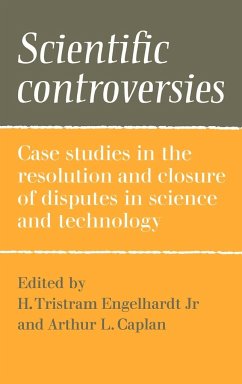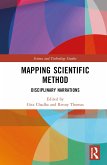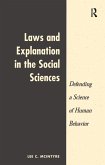This collection of essays examines the ways in which disputes and controversies about the application of scientific knowledge are resolved. Four concrete examples of public controversy are considered in detail: the efficacy of Laetrile, the classification of homosexuality as a disease, the setting of safety standards in the workplace, and the utility of nuclear energy as a source of power. The essays in this volume show that debates about these cases are not confined to matters of empirical fact. Rather, as is seen with most scientific and technical controversies, they focus on and are structured by complex ethical, economic, and political interests. Drs. Engelhardt and Caplan have brought together a distinguished group of scholars from the sciences and humanities, who sketch a theory of scientific controversy and attempt to provide recommendations about the ways in which both scientists and the public ought to seek more informed resolutions of highly contentious issues in science and technology. Scientific Controversies is offered as a contribution to the better understanding of the roles of both science and nonscientific interests in disputes and controversies pertaining to science and technology.
Table of contents:
Preface; Introduction H. Tristram Engelhardt, Jr., and Arthur L. Caplan; Part I. Theoretical Perspectives: 1. Ethical theory and the problem of closure Tom L. Beauchamp; 2. Scientific controversy and its termination Ernan McMullin; 3. The political anatomy of controversy in the sciences Everett Mendelsohn; 4. Controversies involving science and technology: a theoretical perspective Ronald N. Giere; 5. Politics, public policy-making, and the process of reaching closure Robert F. Rich; 6. The role of experts in scientific controversy Garland E. Allen; 7. The continental drift debate Henry Frankel; 8. How history and politics affect closure in biomedical discussions: the example of the Soviet Union Loren R. Graham; 9. Scientific disputes over policy Allan Mazur; 10. Controversies and the authority of science Dorothy Nelkin; 11. Post-Skinner and post-Freud: philosophical causes of scientific disagreements Alasdair MacIntyre; Part II. Contemporary Case Studies: 12. Resolution of the Laetrile controversy: past attempts and future prospects Gerald E. Markle and James C. Petersen; 13. Federal regulation of Laetrile Robert S. K. Young; 14. Quasi libertarianism and the Laetrile controversy Baruch A. Brody; 15. Judicial deflection of scientific questions: pushing the Laetrile controversy toward medical closure Robert L. Schwartz; 16. Politics, science, and the problem of psychiatric nomenclature: a case study of the American Psychiatric Association referendum on homosexuality Ronald Bayer; 17. The diagnostic status of homosexuality in DSM-III: a reformulation of the issues Robert L. Spitzer; 18. On arriving at the American Psychiatric Association decision on homosexuality Irving Bieber; 19. Values in the debate over workplace safety and health: the rancorous rhetoric about regulation Gilbert S. Omenn; 20. The successful experiment that failed Marvin S. Legator; 21. The power of efficiency: balancing benefits and costs in regulating occupational exposure to toxic substances Taylor R. Durham; 22. Closure in occupational safety and health: the benzene and cotton dust decisions Mark MacCarthy; 23. Nuclear fear: a history and an experiment Spencer R. Weart; 24. Closure and controversy: three mile island Cora Bagley Marrett; 25. Understanding the nuclear power controversy Douglas MacLean; Part III. Controversy, Closure, and The Public: 26. The role of the mass media in scientific controversy Rae Goodell; 27. The National Commission on Human Experimentation: procedures and outcomes Stephen E. Toulmin; 28. The forms and norms of closure Ruth Macklin; Author index; Subject index.
Hinweis: Dieser Artikel kann nur an eine deutsche Lieferadresse ausgeliefert werden.
Table of contents:
Preface; Introduction H. Tristram Engelhardt, Jr., and Arthur L. Caplan; Part I. Theoretical Perspectives: 1. Ethical theory and the problem of closure Tom L. Beauchamp; 2. Scientific controversy and its termination Ernan McMullin; 3. The political anatomy of controversy in the sciences Everett Mendelsohn; 4. Controversies involving science and technology: a theoretical perspective Ronald N. Giere; 5. Politics, public policy-making, and the process of reaching closure Robert F. Rich; 6. The role of experts in scientific controversy Garland E. Allen; 7. The continental drift debate Henry Frankel; 8. How history and politics affect closure in biomedical discussions: the example of the Soviet Union Loren R. Graham; 9. Scientific disputes over policy Allan Mazur; 10. Controversies and the authority of science Dorothy Nelkin; 11. Post-Skinner and post-Freud: philosophical causes of scientific disagreements Alasdair MacIntyre; Part II. Contemporary Case Studies: 12. Resolution of the Laetrile controversy: past attempts and future prospects Gerald E. Markle and James C. Petersen; 13. Federal regulation of Laetrile Robert S. K. Young; 14. Quasi libertarianism and the Laetrile controversy Baruch A. Brody; 15. Judicial deflection of scientific questions: pushing the Laetrile controversy toward medical closure Robert L. Schwartz; 16. Politics, science, and the problem of psychiatric nomenclature: a case study of the American Psychiatric Association referendum on homosexuality Ronald Bayer; 17. The diagnostic status of homosexuality in DSM-III: a reformulation of the issues Robert L. Spitzer; 18. On arriving at the American Psychiatric Association decision on homosexuality Irving Bieber; 19. Values in the debate over workplace safety and health: the rancorous rhetoric about regulation Gilbert S. Omenn; 20. The successful experiment that failed Marvin S. Legator; 21. The power of efficiency: balancing benefits and costs in regulating occupational exposure to toxic substances Taylor R. Durham; 22. Closure in occupational safety and health: the benzene and cotton dust decisions Mark MacCarthy; 23. Nuclear fear: a history and an experiment Spencer R. Weart; 24. Closure and controversy: three mile island Cora Bagley Marrett; 25. Understanding the nuclear power controversy Douglas MacLean; Part III. Controversy, Closure, and The Public: 26. The role of the mass media in scientific controversy Rae Goodell; 27. The National Commission on Human Experimentation: procedures and outcomes Stephen E. Toulmin; 28. The forms and norms of closure Ruth Macklin; Author index; Subject index.
Hinweis: Dieser Artikel kann nur an eine deutsche Lieferadresse ausgeliefert werden.








